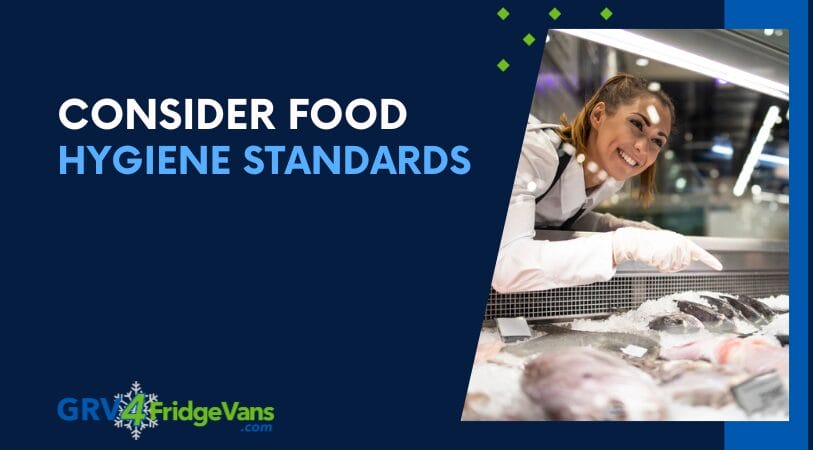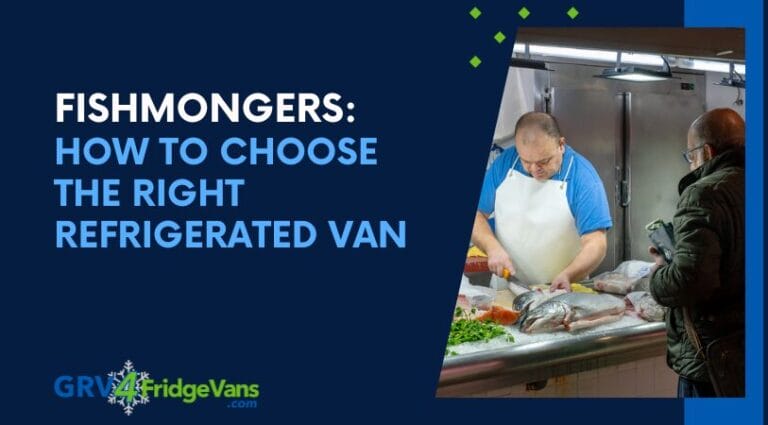It wasn’t long ago that you could only enjoy fresh seafood in coastal towns. Now, thanks to advances in refrigeration and the introduction of the refrigerated van, even those living far inland can experience the job of fresh seafood.
For fishmongers, ensuring the freshness and quality of seafood from the market to the customer’s plate is of paramount importance. A critical aspect of achieving this goal is selecting the right refrigerated van to transport delicate seafood products.
The unique requirements of the seafood industry demand careful consideration when choosing a refrigerated van. In this guide, we’ll explore key factors to help fishmongers make an informed decision when selecting the ideal refrigerated van for their business.

Temperature control
Seafood, especially fish, is highly perishable and requires precise temperature control during transportation.
Choose a refrigerated van that offers accurate temperature settings and has the capability to maintain a consistent and optimal temperature for the type of seafood you are transporting.
Look for vans with advanced temperature monitoring systems to ensure that your valuable cargo remains at the required temperature throughout the journey.
Hygienic by design
Maintaining the hygiene and cleanliness of the refrigerated van is crucial in the seafood industry. Select a van with easy-to-clean interior surfaces and seamless insulation to prevent the accumulation of bacteria and odours.
Smooth, non-porous materials are preferable, as they are easier to sanitise and reduce the risk of cross-contamination.

Ventilation is key
Effective ventilation is essential to prevent the buildup of moisture, which can lead to the deterioration of seafood quality. Look for refrigerated vans equipped with proper ventilation systems that help control humidity levels.
Adequate ventilation not only preserves the freshness of seafood but also helps to prevent the build up of odours. While some smells are expected when delivering seafood, it could damage your company reputation if your van has an unpleasant odour.
Corrosion resistance
Given the nature of the seafood business, where saltwater exposure is common, it’s crucial to choose a refrigerated van with components that are resistant to corrosion.
Stainless steel or other corrosion-resistant materials are ideal for the interior and exterior of the van, ensuring durability and longevity despite the challenging conditions.
Salt water can lead to the breakdown of the seals and gaskets on your van, so make sure you check them regularly to ensure they are working effectively.

Size matters
Consider the size and configuration of the refrigerated van based on the volume and variety of seafood your business handles.
A well-designed van should offer ample space for various types of seafood, and it should be configurable to accommodate different storage requirements, such as racks or bins for different products.
There are vans available with the ability to have different sections of the van at different temperatures. For example, you could have a deep freeze section for frozen products and a chiller section for fresh products.
Easy loading and unloading
The van needs to be ergonomic and easy to load and unload for your employees. If they struggle to access the loading bay, there is an increased risk of dropping products or damaging it.
Opt for a refrigerated van with features like a rear ramp, side doors, and interior shelving systems to facilitate easy access to seafood products. These features not only save time but also help in organising and securing the cargo properly.

Consider food hygiene standards
The seafood industry is subject to strict health and safety regulations. Ensure that the refrigerated van will allow you to stay in line with food hygiene standards and regulations.
Your van is essentially an extension of your business premises, so you simply need to carry over any cleaning processes and procedures you would normally follow in your main premises.
Compliance with regulations is not only a legal requirement but also crucial for maintaining the integrity of your business and ensuring customer trust.
Closing thoughts
As a fishmonger, your reputation rests on your ability to deliver fresh fish that has been stored in optimum conditions. Restaurants and caterers will rely on you to get it right every time, and this task is made easier thanks to the introduction of the refrigerated van. With so many options available, it’s important to take your time to find the right van for your needs.
Consider things like the size, flexibility of the configuration and reliability of the refrigeration unit. You’ll also need to make sure you can remain compliant with food hygiene standards to protect your business from liability. If you’re unsure which van is right for your needs, look at what other professionals in your industry are using and ask for their advice.




